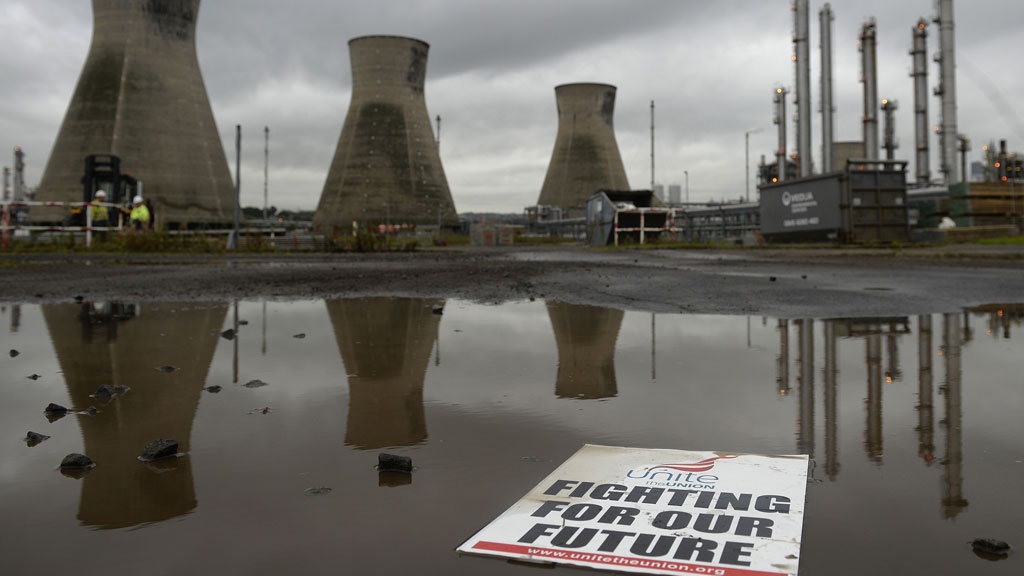Trade union ‘intimidation’ tactics probed
David Cameron orders an inquiry into the “intimidation” tactics of the trade unions in the wake of the Grangemouth oil refinery closure but is warned against the risk of “union-bashing”.

Downing Street said the wide-ranging review, headed by Bruce Carr QC, will investigate allegations of the use of so-called “leverage” tactics by the unions as well as the impact of such disputes on the critical national infrastructure.
However, in a sign of renewed coalition tensions, the Liberal Democrat Business Secretary Vince Cable made clear he had only agreed to the inquiry on the basis that it would also examine the practices of employers, such as the “blacklisting” of workers.
‘Tory election stunt’
The Unite union dismissed the review as a “Tory election stunt” and warned that no trade union would be prepared to “collaborate” with it.
The review follows claims that Unite sought to intimidate executives from Ineos, owners at the Grangemouth oil refinery in Scotland, including sending “mobs” of demonstrators to protest outside their homes and premises associated with Ineos chairman, Jim Ratcliffe.
In recent weeks the prime minister has repeatedly attacked the union in the Commons, challenging Labour leader Ed Miliband to hold an inquiry into claims of vote-rigging in the Falkirk constituency party in an attempt to secure the selection of Unite’s favoured candidate for parliament.
Unite general secretary Len McCluskey has always denied any intimidation or bullying on the part of the union, insisting that it was acting within the law.
‘Intimidatory actions’
As part of his remit, Mr Carr will consider whether existing laws are sufficient to prevent what government sources described as “inappropriate or intimidatory actions” in trade disputes as well as the response of the police to complaints.
More generally, the review will look at the underlying causes of industrial relations difficulties in affected industries, the potential impact on the UK’s critical national infrastructure and the consequences for investor confidence in key sectors.
It will also make recommendations on the respective roles of government, employers and employee representatives in ensuring effective workforce relationships.
Read more: Grangemouth union U-turn to save petrochemical plant
Cabinet Office Minister Francis Maude, a Conservative, said: “Allegations about trade union industrial intimidation tactics, including attempts to sabotage businesses supply chains and harass employers’ families are deeply concerning.
“That’s why we need an independent review to get to the bottom of these activities, as well as to look at the role played by government, employers and employees in industrial disputes.
“This forms part of our long-term plan to ensure Britain remains competitive and to secure an economic recovery for hard-working people.”
Mr Cable, in contrast emphasised that Britain had generally enjoyed good industrial relations for the past two decades while strikes were at a historically low level.
“There were clearly some very serious matters going on in Grangemouth. That is why I have agreed to a proportionate and rational review of industrial disputes, including leverage and other tactics used by both unions and employers,” he said.
“There are rogue unions but there are also rogue employers, some of whom have in the past engaged in illegal tactics like blacklisting. This government will tolerate neither”
‘Union-bashing’
In a further sign of coalition tensions, Mr Cable’s party colleague Danny Alexander, the treasury chief secretary, has now indicated that the Lib Dems will only agree to any recommendations to change the law if they were convinced they would lead to an improvement in industrial relations.
“If there are measured, sensible, prudent reforms that could help to improve the industrial relations landscape yet further, I’d be up for that. What I’m not up for is a bunch of union-bashing,” he told Sky News’s Murnaghan programme.
A Unite spokesman said: “This review is a sorry attempt by the coalition to divert attention from the cost of living crisis. Vince Cable may not have noticed but the Grangemouth dispute has been settled. This review is nothing more than a Tory election stunt which no trade unionist will collaborate with.”
GMB general secretary Paul Kenny said: “At a time when living standards are falling, when people are struggling to pay energy bills, when executive pay is rocketing and when investment in industry by cash rich employers has fallen through the floor this announcement seems like another sop to the Tory backbenches.
Read more: Labour and the unions - the key questions
“One of the questions that needs to be answered about Grangemouth is how could one man (Mr Ratcliffe), a non resident at that, be able with impunity to hold the country to ransom by having the unfettered power to shut down a facility vital to the well being of the nation and the economy of Scotland. That is the real scandal at Grangemouth.
Mr Carr, a leading industrial relations lawyer, will head a three-strong panel sitting alongside one representative each from the employers and the unions.
They will be supported by a secretariat made up of officials drawn from the Cabinet Office, the Department for Business Innovation and Skills, and more widely across government.
Once the panel is in place, it will be tasked with gathering evidence and producing recommendations within six months. It will report jointly to Mr Maude and Mr Cable.